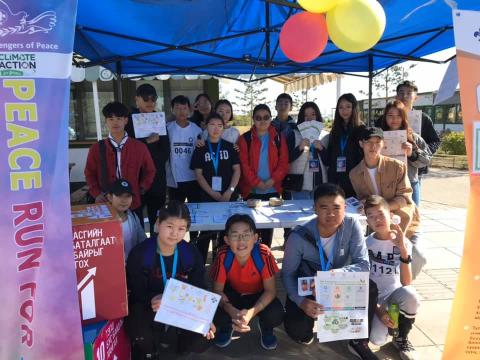Zero Waste through Scouting

Since 2019, a group of Mongolian Scouts has initiated a project called Zero Waste through Scouting in a campaign that encourages everyone, especially young people, to buy and consume only what they need and to reduce and manage their waste. This project targets Sustainable Development Goals (SDG) 12 to 15.
On May 2019, a Zero Waste team consisting of 22 Coordinators and 13 volunteers between the ages of 14 to 23 participated in seven trainings facilitated by waste management experts from a government institution and Non-Government Organizations. The knowledge gained by participants was re-echoed to the communities in four workshops having 4,400 people.
The government organised the first workshop at the Ulaanbaatar International Marathon thus reaching more than 2,000 people. The second workshop was simultaneous with the Peace Run for the SDGs where the team operated a booth and received more than 1,000 participants who were introduced into the 3Rs (Reduce, Reuse and Recycle) and zero-waste lifestyle.
The third workshop was organised at the Maxmall Shopping Centre where five stations were set up, with each station assigned a specific area which included waste management, 3Rs and choosing zero-waste lifestyle as well as learning by doing on reusing waste. The last workshop was at the 116th Basic Unit Leader Training where a special program for school children was arranged, calling it Zero Waste Hero. Around 170 Scouts engaged in the activity.
Temuulen Oyunerdene, a coordinator of the Zero Waste team, shares his experience on the project: “I have been on the zero-waste project for half a year during which I understood that zero waste is clear conscience for reduction that promotes the reshaping of resource lifecycles so that all products can be reused.
“The main point is: We reduce what we consume, reuse as much as possible, send little for recycling and compost what we cannot." The city of Ulaanbaatar sends an average of 1.4 million tons of garbage to the landfill each year. Of 1.4 million tons of waste, 85% are recyclable”, he added.
For this year, due to the COVID-19 pandemic, the training course is postponed. However, the team formed a project online with the support of partners where they engage school children and young adults with different Zero Waste Lifestyle challenges through social media.


